Unit 9 Have you ever been to a museum? Section A (3a-3c) 教学课件
文档属性
| 名称 | Unit 9 Have you ever been to a museum? Section A (3a-3c) 教学课件 |  | |
| 格式 | zip | ||
| 文件大小 | 7.1MB | ||
| 资源类型 | 教案 | ||
| 版本资源 | 人教新目标(Go for it)版 | ||
| 科目 | 英语 | ||
| 更新时间 | 2015-06-06 10:46:27 | ||
图片预览

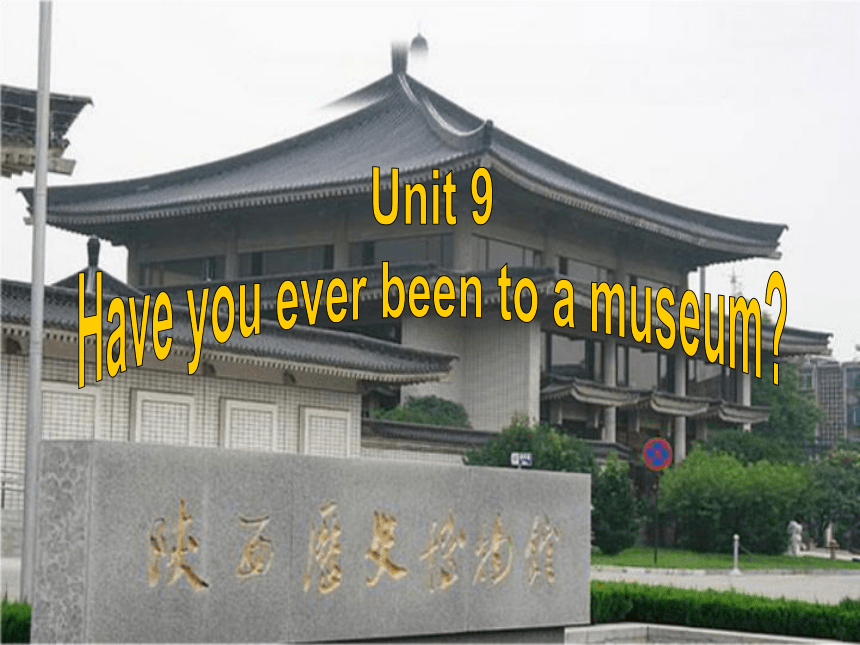
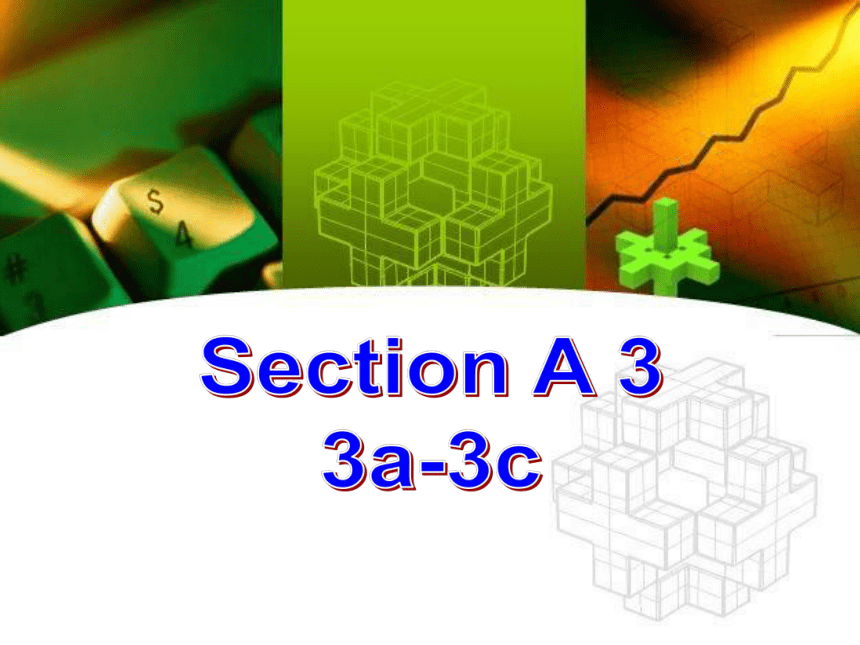
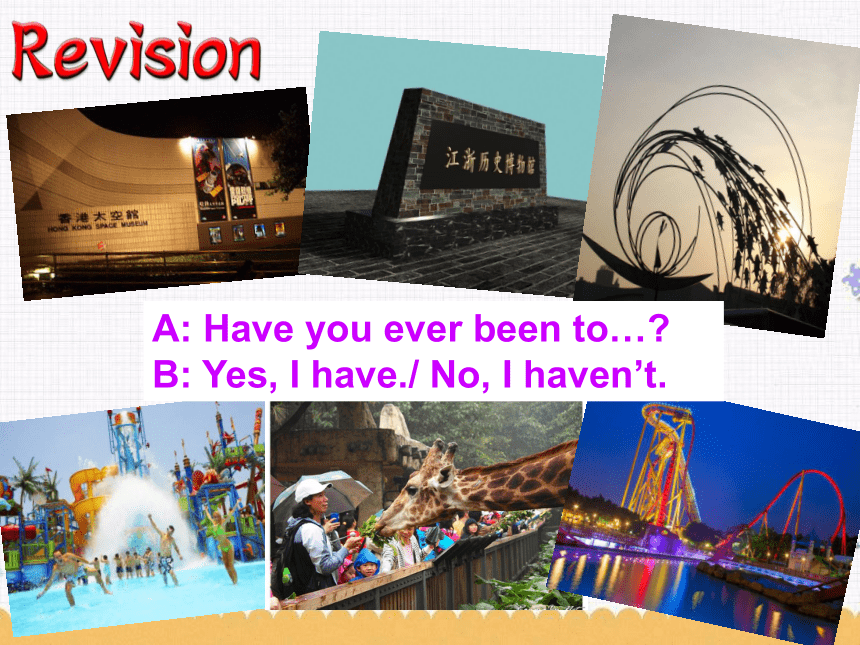
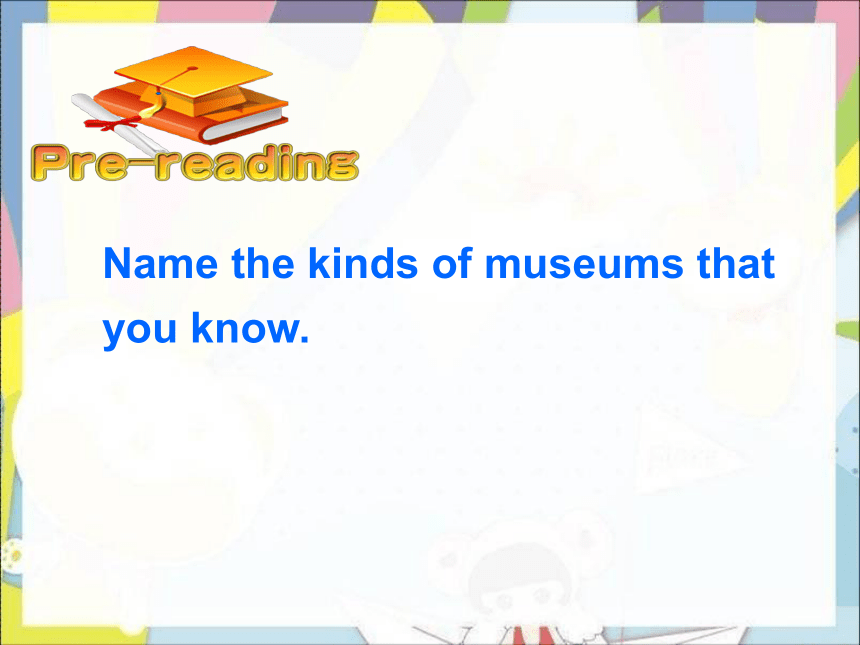
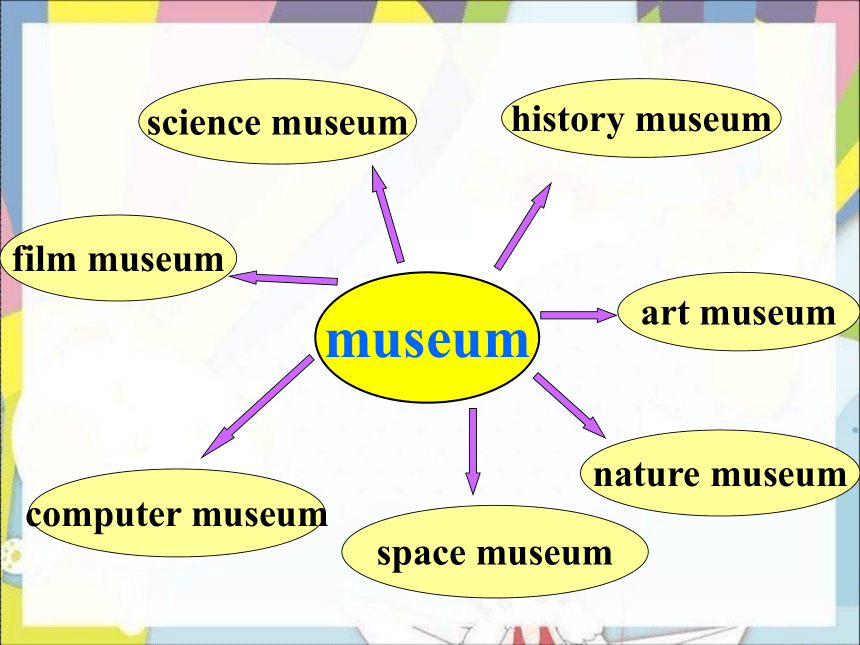
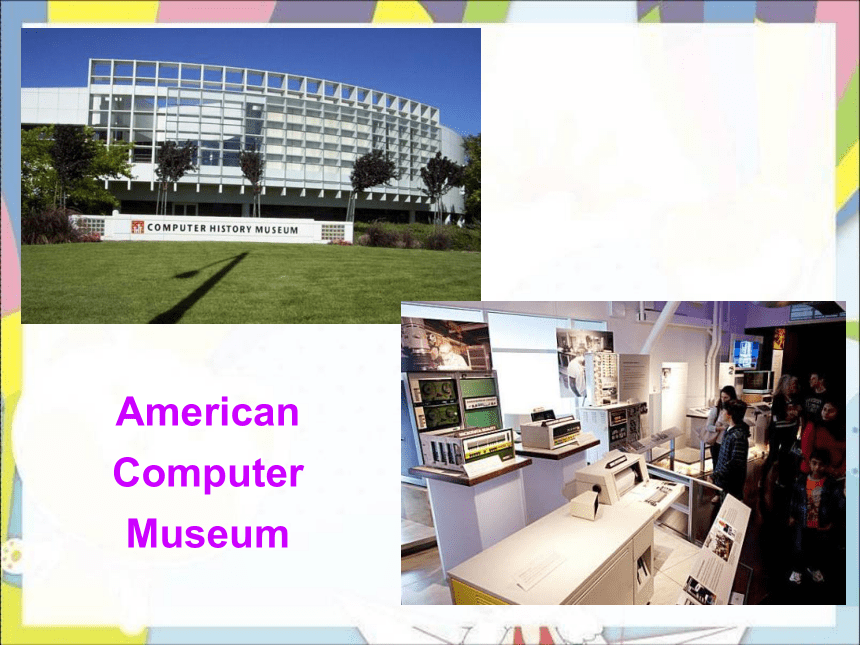
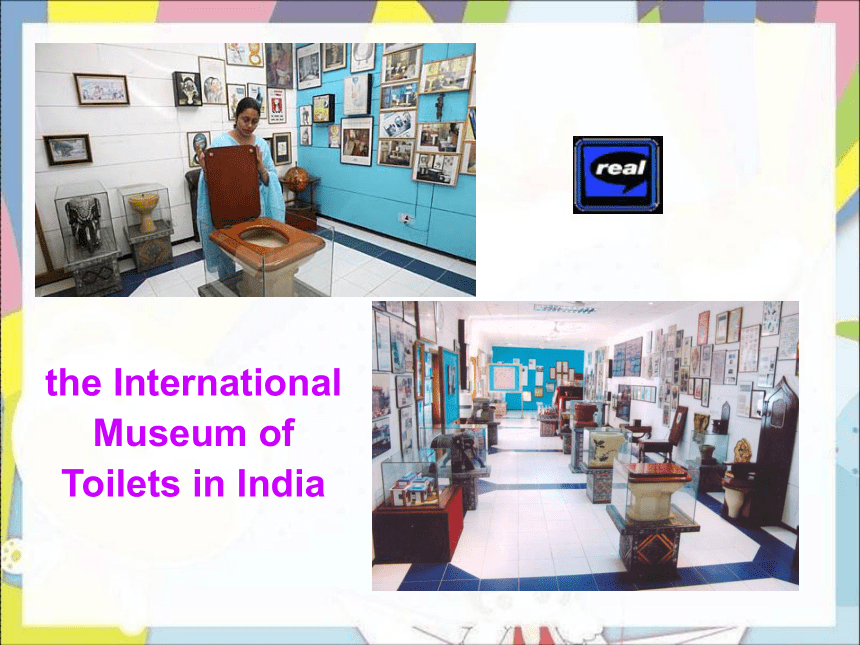


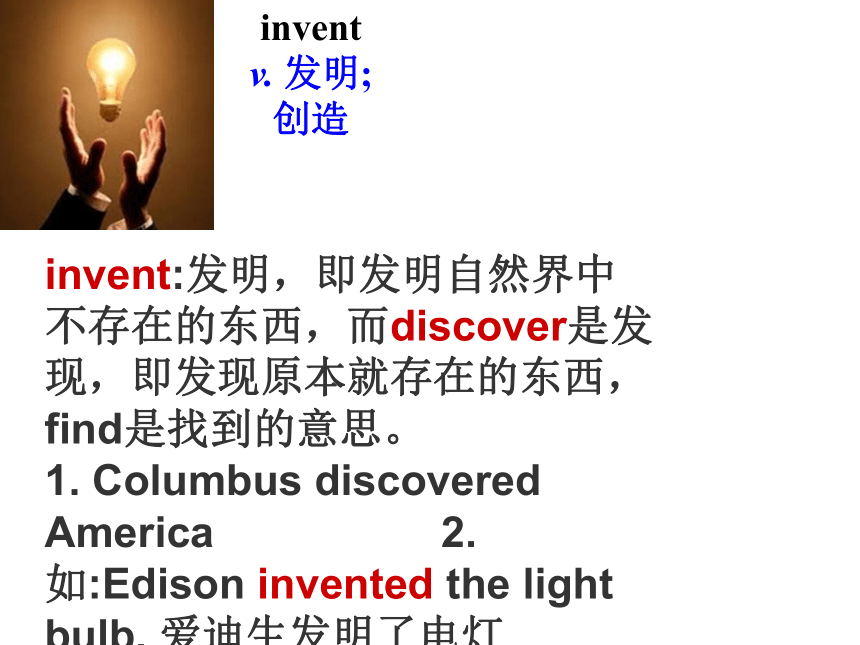

文档简介
课件41张PPT。Unit 9Unit 9
Have you ever been to a museum?Section A 3
3a-3cA: Have you ever been to…?
B: Yes, I have./ No, I haven’t.Name the kinds of museums that you know.museumhistory museum
computer museum
art museumnature museumscience museumspace museumfilm museumAmerican Computer Museumthe International Museum of Toilets in IndiaHangzhou National Tea Museuminvent
v. 发明; 创造invent:发明,即发明自然界中不存在的东西,而discover是发现,即发现原本就存在的东西,find是找到的意思。1.?Columbus discovered America 2.如:Edison?invented?the light bulb. 爱迪生发明了电灯unbelievable
adj. 难以置信的; 不真实的progress
v.& n. 进步; 进展make progress in(doing)sth 在…方面取得进步/进展 That story is unbelievable.这故事令人难以置信 ?We all decided to make?progress?in the new term.我们都决心要在新学期取得更大进步. rapid adj. 迅速的; 快速和fast通用, tea set 茶具He had a?rapid?recovery from his illness他迅速恢复了健康。?unusual
adj. 特别的;不寻常的It was not?unusual?for me to come home late.表示否定的前缀 1.dis-加在名词、形容词,动词之前. disadvantage(缺点)dishonorable(不光彩的)disagree(不同意)disappear(消失), 2.in-加在形容词,名词之前 incorrect(不正确的),inability(无能,无力),inaccurate(不准确的) 3.im-加在字母m,b,p之前 impossible(不顺能的),impolite(不礼貌的),impudence(厚颜无耻) 4.un-加在名词,形容词,副词之前 unfinished(未完成的)undoubted(无疑的)unusual特别的;不寻常unbelievable难以置信5.mis-加在动词、名词之前 misunderstand(误解),misjudge(误判) 6.il-加在以l 开头的词前 illegal(非法的),illiterate(文盲的,无文化的)illogical(不合逻辑的) 7.ir-加在以r开头的词前 irregular(不稳定的),irresistable(不可抵抗的),irresolvable(不能分解的,不能解决的) social[‘s?u??l]
adj. 社会的George stayed out of the social life of the school. 乔治置身于该校社交生活之外。 The eastern tea art is famous all over the world.peaceful
adj. 和平的; 安宁的I like the?peaceful?world。我爱这个和平的世界performance n. 表演; 演出perfect
adj. 完美的; 完全的?The evening?performance?begins at 8 o'clock.??Her acting is really?perfect. 她的演技真到了炉火纯青的境界。 2. 精通的;娴熟的 Practice makes?perfect. 熟能生巧。collect v. 收集; 采集collector 收藏家 collection 收藏 ?Why do you?collect?stamps? 你为何集邮?I show my stamp collection to John.我让约翰看我的邮票集 Collecting stamps is a good hobby 收集邮票是个很好的爱好 I am collecting British stamps.我在收集英国邮票.itself pron. (it的反身代词)它自己This thing itself is not very important. 这件事本身没那么重要. toilet n. 坐便器; 厕所Encourage/?n'k?r?d? /vt.鼓励;促进;支持
encourage sb. to do sth.
鼓励某人做某事
e.g. My father encouraged me to take
part in the sports meeting.
父亲鼓励我参加运动会。 否定表达 encourage sb. not to do sth 3a. Three students talk about the most interesting museums they have ever been to. Read the magazine article and
answer the questions.1. Which three museums do the students talk about? The American Computer Museum, the International Museum of Toilets and Hangzhou National Tea Museum.2. What do you think is the most interesting
thing about each museum? I think the most interesting thing about the American Computer Museum is that there is a special computer can play chess even better than humans , about the International Museum of Toilets is that there are so many different kinds of toilets, about the Hangzhou Natinal Tea Museum is Watching the teapreparation.1. What does Ken say about the
American Computer Museum?
It’s unbelievable that technology has
progressed in such a rapid way.
2. What can we learn at the
International Museum of Toilets?
We can learn the history and
development of toilets.3b. Read the article again and answer the following questions3. Why is the Hangzhou National Tea
Museum a nice place to enjoy tea?
Because it’s a relaxing and peaceful
place near a lake.1. The most interesting museum I’ve been to is the American Computer Museum.
多音节词和部分双音节形容词最高级加most构成,前面加the。如: the most beautiful girl
2. The old computers were much bigger.
much可修饰形容词比较级,表示……得多。
如: much richer
a little, even, a bit也可以修饰形容词比较级。 Explanation3. I wonder how much more computer will be able to do in the future.
不知道将来电脑还能够做些什么事情呢。
1)wonder 表示“ (对某事)感到疑惑;想要
知道;想弄明白;琢磨”,后面常接由what,
how, who 或者if/whether引导的宾语从句。
e.g. I wonder how they’re getting on.
我想知道他们现在过得怎样。
I just wonder if they’ve arrived safely.
我就想知道他们是否安全抵达了。
2) 此句从句部分的原始结构是: How much more will computers be able to do in the future? 是对陈述句Computers will be able to do (much) more in the future.(电脑将来能够做更多的事情。)的提问。由于充当了宾语从句, 疑问结构改成了陈述结构:how much more computers will be able to do in the future, 即: 将助动词还原到陈述句的位置。
e.g. I don’t know when he will come.
我不知道他什么时候来。
I don’t know where he lives.
我不知道他住在哪里。4. The International Museum of Toilets.
国际马桶博物馆
这是位于印度新德里的一个主题式展览馆,收藏、陈列的马桶装置十分丰富,从古至今,应有尽有,简直就是一部厕所的发展史。参观者可从不同角度去认识厕所的演变 史。同时,博物馆里还收藏了许多名人用过的厕所及相关物品的复制品,旨在开拓人们 视野,进行社会文明教育,推广环保宣传和研究。5. It also encourages governments and social groups to think about ways to…
think about sth 考虑.问题 think of think of主要表示“考虑,关心,想起 think out 译为 思考出 考虑出 把问题想明白的意思 think over 在考虑考虑 慎重考虑的意思 6. Watching the tea preparation is just as enjoyable as drinking the tea itself.
看沏茶的过程和饮茶本身一样令人愉快。
-able是一个典型的形容词后缀, 可加在动词之后, 表示“可…..的; 能够……的”。此处enjoyable(能使人快乐的; 令人愉快的) 便是一例, 再如:drinkable(可饮用的), washable(可洗的), readable(可读的), usable(可用的; 可使用的)等等。3c. Which of the underlined words in the passage have the following meanings?make (something) better
become better uncommon
Quiet
made
quick improveprogressunusualpeacefulinventrapidRead the article and match the words with its meaning. progress
rapid
unusual
peaceful
improve
invented make sth. better
become better
uncommon
quiet
made
quick1. Where _____ you _____, John? I’m looking for you everywhere.
A. have; been B. have ;been to
C. have; gone D. did; go to
2. How long _____ your father _____ Shanghai?
A. did; come B. has; go to
C. has; been to D. has; been in一 单项选择。A. have; beenD. has; been inExercises3. I _____ my watch in my bedroom yesterday.
A. left B. forgot
C. have forgotten D. have left
4. She has worked in the factory _____.
A.since three years ago B. for 1999
C. since in 1999 D. since three yearsA. leftA.since three years ago1. Have you seen Mrs. Tang these days? (yes)
_________________________________
2. Have you played kites this spring? (no)
_________________________________
3. Have they watched the movie The Titanic? (yes)
__________________________________
4. Has your mother ever been to Tibet? (never.)
_____________________________________ 二 用括号中给出的词回答问题。 No, she has never been to Tibet. ( No, never. )Yes, I have.No, I haven’t.Yes, they have.5. How long have you played piano? (two hours)
____________________________________
6. How long has Tom listened to English songs?
(twelve years old)
_____________________________________
7. How many English story books have they read
this semester? (six)
_____________________________________
8. How many cities have you visited? (twelve)
______________________________________I have visited twelve cities. I have played piano for two hours.Since he was twelve years old.They have read six English story books.1. Remember the words and expressions.
2. Review the next lesson.
Have you ever been to a museum?Section A 3
3a-3cA: Have you ever been to…?
B: Yes, I have./ No, I haven’t.Name the kinds of museums that you know.museumhistory museum
computer museum
art museumnature museumscience museumspace museumfilm museumAmerican Computer Museumthe International Museum of Toilets in IndiaHangzhou National Tea Museuminvent
v. 发明; 创造invent:发明,即发明自然界中不存在的东西,而discover是发现,即发现原本就存在的东西,find是找到的意思。1.?Columbus discovered America 2.如:Edison?invented?the light bulb. 爱迪生发明了电灯unbelievable
adj. 难以置信的; 不真实的progress
v.& n. 进步; 进展make progress in(doing)sth 在…方面取得进步/进展 That story is unbelievable.这故事令人难以置信 ?We all decided to make?progress?in the new term.我们都决心要在新学期取得更大进步. rapid adj. 迅速的; 快速和fast通用, tea set 茶具He had a?rapid?recovery from his illness他迅速恢复了健康。?unusual
adj. 特别的;不寻常的It was not?unusual?for me to come home late.表示否定的前缀 1.dis-加在名词、形容词,动词之前. disadvantage(缺点)dishonorable(不光彩的)disagree(不同意)disappear(消失), 2.in-加在形容词,名词之前 incorrect(不正确的),inability(无能,无力),inaccurate(不准确的) 3.im-加在字母m,b,p之前 impossible(不顺能的),impolite(不礼貌的),impudence(厚颜无耻) 4.un-加在名词,形容词,副词之前 unfinished(未完成的)undoubted(无疑的)unusual特别的;不寻常unbelievable难以置信5.mis-加在动词、名词之前 misunderstand(误解),misjudge(误判) 6.il-加在以l 开头的词前 illegal(非法的),illiterate(文盲的,无文化的)illogical(不合逻辑的) 7.ir-加在以r开头的词前 irregular(不稳定的),irresistable(不可抵抗的),irresolvable(不能分解的,不能解决的) social[‘s?u??l]
adj. 社会的George stayed out of the social life of the school. 乔治置身于该校社交生活之外。 The eastern tea art is famous all over the world.peaceful
adj. 和平的; 安宁的I like the?peaceful?world。我爱这个和平的世界performance n. 表演; 演出perfect
adj. 完美的; 完全的?The evening?performance?begins at 8 o'clock.??Her acting is really?perfect. 她的演技真到了炉火纯青的境界。 2. 精通的;娴熟的 Practice makes?perfect. 熟能生巧。collect v. 收集; 采集collector 收藏家 collection 收藏 ?Why do you?collect?stamps? 你为何集邮?I show my stamp collection to John.我让约翰看我的邮票集 Collecting stamps is a good hobby 收集邮票是个很好的爱好 I am collecting British stamps.我在收集英国邮票.itself pron. (it的反身代词)它自己This thing itself is not very important. 这件事本身没那么重要. toilet n. 坐便器; 厕所Encourage/?n'k?r?d? /vt.鼓励;促进;支持
encourage sb. to do sth.
鼓励某人做某事
e.g. My father encouraged me to take
part in the sports meeting.
父亲鼓励我参加运动会。 否定表达 encourage sb. not to do sth 3a. Three students talk about the most interesting museums they have ever been to. Read the magazine article and
answer the questions.1. Which three museums do the students talk about? The American Computer Museum, the International Museum of Toilets and Hangzhou National Tea Museum.2. What do you think is the most interesting
thing about each museum? I think the most interesting thing about the American Computer Museum is that there is a special computer can play chess even better than humans , about the International Museum of Toilets is that there are so many different kinds of toilets, about the Hangzhou Natinal Tea Museum is Watching the teapreparation.1. What does Ken say about the
American Computer Museum?
It’s unbelievable that technology has
progressed in such a rapid way.
2. What can we learn at the
International Museum of Toilets?
We can learn the history and
development of toilets.3b. Read the article again and answer the following questions3. Why is the Hangzhou National Tea
Museum a nice place to enjoy tea?
Because it’s a relaxing and peaceful
place near a lake.1. The most interesting museum I’ve been to is the American Computer Museum.
多音节词和部分双音节形容词最高级加most构成,前面加the。如: the most beautiful girl
2. The old computers were much bigger.
much可修饰形容词比较级,表示……得多。
如: much richer
a little, even, a bit也可以修饰形容词比较级。 Explanation3. I wonder how much more computer will be able to do in the future.
不知道将来电脑还能够做些什么事情呢。
1)wonder 表示“ (对某事)感到疑惑;想要
知道;想弄明白;琢磨”,后面常接由what,
how, who 或者if/whether引导的宾语从句。
e.g. I wonder how they’re getting on.
我想知道他们现在过得怎样。
I just wonder if they’ve arrived safely.
我就想知道他们是否安全抵达了。
2) 此句从句部分的原始结构是: How much more will computers be able to do in the future? 是对陈述句Computers will be able to do (much) more in the future.(电脑将来能够做更多的事情。)的提问。由于充当了宾语从句, 疑问结构改成了陈述结构:how much more computers will be able to do in the future, 即: 将助动词还原到陈述句的位置。
e.g. I don’t know when he will come.
我不知道他什么时候来。
I don’t know where he lives.
我不知道他住在哪里。4. The International Museum of Toilets.
国际马桶博物馆
这是位于印度新德里的一个主题式展览馆,收藏、陈列的马桶装置十分丰富,从古至今,应有尽有,简直就是一部厕所的发展史。参观者可从不同角度去认识厕所的演变 史。同时,博物馆里还收藏了许多名人用过的厕所及相关物品的复制品,旨在开拓人们 视野,进行社会文明教育,推广环保宣传和研究。5. It also encourages governments and social groups to think about ways to…
think about sth 考虑.问题 think of think of主要表示“考虑,关心,想起 think out 译为 思考出 考虑出 把问题想明白的意思 think over 在考虑考虑 慎重考虑的意思 6. Watching the tea preparation is just as enjoyable as drinking the tea itself.
看沏茶的过程和饮茶本身一样令人愉快。
-able是一个典型的形容词后缀, 可加在动词之后, 表示“可…..的; 能够……的”。此处enjoyable(能使人快乐的; 令人愉快的) 便是一例, 再如:drinkable(可饮用的), washable(可洗的), readable(可读的), usable(可用的; 可使用的)等等。3c. Which of the underlined words in the passage have the following meanings?make (something) better
become better uncommon
Quiet
made
quick improveprogressunusualpeacefulinventrapidRead the article and match the words with its meaning. progress
rapid
unusual
peaceful
improve
invented make sth. better
become better
uncommon
quiet
made
quick1. Where _____ you _____, John? I’m looking for you everywhere.
A. have; been B. have ;been to
C. have; gone D. did; go to
2. How long _____ your father _____ Shanghai?
A. did; come B. has; go to
C. has; been to D. has; been in一 单项选择。A. have; beenD. has; been inExercises3. I _____ my watch in my bedroom yesterday.
A. left B. forgot
C. have forgotten D. have left
4. She has worked in the factory _____.
A.since three years ago B. for 1999
C. since in 1999 D. since three yearsA. leftA.since three years ago1. Have you seen Mrs. Tang these days? (yes)
_________________________________
2. Have you played kites this spring? (no)
_________________________________
3. Have they watched the movie The Titanic? (yes)
__________________________________
4. Has your mother ever been to Tibet? (never.)
_____________________________________ 二 用括号中给出的词回答问题。 No, she has never been to Tibet. ( No, never. )Yes, I have.No, I haven’t.Yes, they have.5. How long have you played piano? (two hours)
____________________________________
6. How long has Tom listened to English songs?
(twelve years old)
_____________________________________
7. How many English story books have they read
this semester? (six)
_____________________________________
8. How many cities have you visited? (twelve)
______________________________________I have visited twelve cities. I have played piano for two hours.Since he was twelve years old.They have read six English story books.1. Remember the words and expressions.
2. Review the next lesson.
同课章节目录
- Unit 1 What's the matter?
- Section A
- Section B
- Unit 2 I'll help to clean up the city parks.
- Section A
- Section B
- Unit 3 Could you please clean your room?
- Section A
- Section B
- Unit 4 Why don't you talk to your parents?
- Section A
- Section B
- Unit 5 What were you doing when the rainstorm came
- Section A
- Section B
- Review of Units 1-5
- Unit 6 An old man tried to move the mountains.
- Section A
- Section B
- Unit 7 What's the highest mountain in the world?
- Section A
- Section B
- Unit 8 Have you read Treasure Island yet?
- Section A
- Section B
- Unit 9 Have you ever been to a museum?
- Section A
- Section B
- Unit 10 I've had this bike for three years.
- Section A
- Section B
